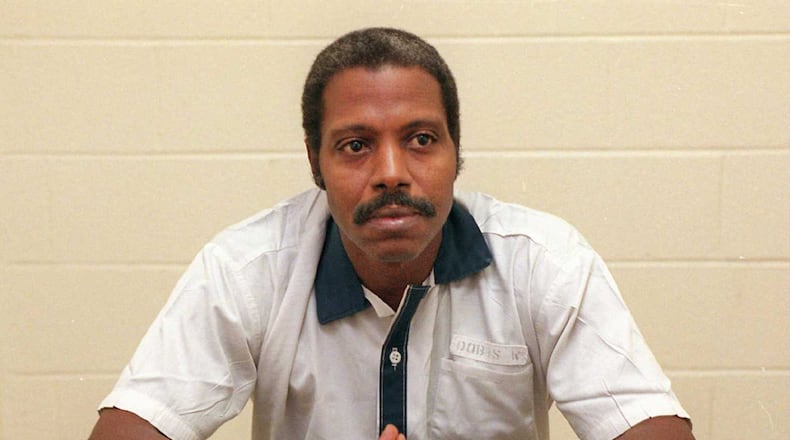An aging killer was sentenced to life without parole on Friday, 43 years after the murder for which he is being punished.
Wilburn Wiley Dobbs, now 67 and in poor health, used a cane to walk into the courtroom in LaFayette.
On Dec. 14, 1973, during an armed robbery of a Chickamauga food store, Dobbs used a shotgun to kill Roy Lee Sizemore Sr. as Sizemore lay on the floor of his grocery.
Dobbs was sentenced to death in 1974 — one of the first killers to be condemned after Georgia reinstated the death penalty. But a federal court set aside the sentence in 1998 and ordered a new sentencing trial for Dobbs. The re-sentencing hearing took place Friday at the Walker County Courthouse.
Dobbs is just a year older than Eddie Sizemore, who came upon his father’s dead body all those years ago and has never forgotten the horror of it.
“I found my father killed,” Sizemore told Judge Kristina Cook Graham. “I see it every day.”
After testifying, he went back to his seat and wept.
Sizemore was 23 when his father was shot and beaten. Now he is 66, bald and has a white beard.
Sizemore walked with a slight limp as he passed a few feet from Dobbs on his way to the witness stand Friday afternoon. Speaking for his nieces and his sister in the courtroom, Sizemore paused frequently as he spoke to Graham, the chief judge of the Lookout Mountain Judicial Circuit. The weeping man covered his face with his hands once he reached his seat next to his sister, his only surviving sibling out of the original seven.
“I want him in prison for the rest of his life,” Sizemore said.
Dobbs was convicted and sentenced to die on May 22, 1974. But his punishment had been in limbo since 1998, when the 11th U.S. Circuit Court ordered him re-sentenced on the grounds that Dobbs' lawyer had done little to persuade jurors to at least consider a life sentence.
The federal court noted that during the sentencing portion of the first trial, Dobbs’ lawyer spent a majority of time reading one of the consenting opinions to a U.S. Supreme Court ruling that struck down the death penalty in 1972.
Georgia had re-established the death penalty in 1973 using the Supreme Court’s 1972 ruling as a guide. Dobbs’ lawyer argued that Georgia’s new death penalty was unlikely to survive.
Instead, a U.S. Supreme Court ruling in 1976 reinstated capital punishment nationwide.
In September 2002, the district attorney filed notice that he would again seek the death penalty against Dobbs.
But there was little effort to hold a new sentencing trial. Even though his death sentence was set aside, Dobbs remained on death row until his health started to fail in recent years.
“It’s taken a great deal of time for us to get here,” Judge Graham said.
At the start of Friday’s brief sentencing hearing, Graham said prosecutors and defense attorneys were ready for a trial on Dobbs’ punishment. If prosecutors had decided to re-pursue the death penalty, it would have required seating new jurors to hear all the evidence.
Instead both sides agreed that it made sense to accept life without parole, especially in light of Dobbs' poor health. Dobbs suffers numerous health problems and has only one kidney because he donated the other to his mother in 1993.
“At this stage it makes no sense to go through a death penalty trial,” said Dobbs attorney Jack Martin. “The man sentenced to life without parole (on Friday) is not the same man (who murdered Sizemore).”
To execute Dobbs now, Martin said, “would be like executing a proxy.”
There are 58 men on Georgia's death row and the state is preparing to carry out its ninth lethal injection of the year on Tuesday.
About the Author
The Latest
Featured
